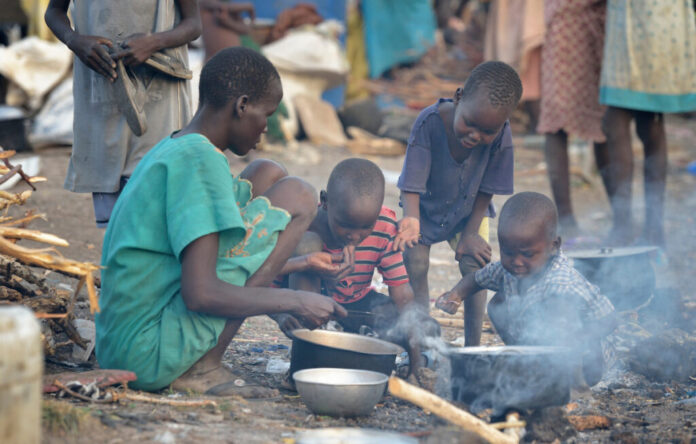The report, titled Food Wars, reveals that approximately 21,000 people are at risk of dying from hunger every day in conflict-affected countries.
Oxfam’s study focuses on 54 countries experiencing ongoing violence, accounting for most of the 281.6 million people facing acute hunger worldwide.
South Sudan is one of the most affected nations, with its population enduring severe levels of food insecurity due to continuous conflict.
This came as the world observed World Food Day, a stark reminder of the global hunger crisis laid bare by a new Oxfam report.
Emily Farr, Oxfam’s Food and Economic Security Lead, spoke about the disturbing trend of using hunger as a tool of war. She stated that starvation is being used deliberately as a weapon, worsening the humanitarian crisis.
“Starvation has become a lethal weapon used by warring parties, violating international laws and causing a rise in human deaths and suffering. That civilians are subjected to such slow death in the 21st century is a collective failure,” Farr said.
Starvation Crimes in Conflict Zones
The report emphasizes how hunger is often weaponized in conflict zones, turning food insecurity into a deliberate tactic of war.
Blocking access to essential supplies, targeting food production, and disrupting markets are just some strategies used by warring factions to weaken communities. These actions contribute to what the report calls “starvation crimes,” a violation of international humanitarian law.
Oxfam highlights that despite being resource-rich, many of these countries remain trapped in cycles of poverty and violence. This is particularly true in South Sudan and Sudan.
For instance, 95% of Sudan’s export earnings come from gold and livestock, while 87% of South Sudan’s exports are petroleum products. While these nations possess valuable natural resources, their economies are heavily dependent on raw material exports, leaving their domestic populations vulnerable to hunger—especially during periods of conflict when agriculture is often disrupted.
Economic Inequality and Hunger
The reliance on exports, particularly in resource-rich conflict zones, has created deep economic inequalities. Oxfam’s report underscores that addressing hunger requires more than just providing emergency food aid.
The structural issues that perpetuate inequality and exclusion must be tackled. Farr pointed out that peace-building efforts must address these deep-rooted economic inequalities and the generational grievances that fuel violence.
“Peacebuilding must address the root causes of conflict, including inequality and grievances passed down through generations. We cannot continue with surface-level solutions focused solely on economic growth through foreign investments.
There must be accountability for those responsible for starvation crimes and a renewed global commitment to achieving ‘zero hunger’ by 2030,” Farr said.
International Response and the Path Forward
The Oxfam report calls on the international community to do more than just deliver aid. Governments and organizations must focus on building resilience within conflict-affected populations by fostering sustainable agricultural systems and empowering local economies.
Additionally, Oxfam urges world leaders to hold accountable those who use starvation as a weapon and to uphold international laws that protect civilians during war.
Oxfam’s Food Wars report comes as a grim reminder that the road to achieving “zero hunger” by 2030 is becoming increasingly challenging.
As conflicts continue to rage in places like South Sudan, Yemen, and Afghanistan, the global hunger crisis deepens, demanding urgent action from the international community.
In the meantime, humanitarian organizations, including Oxfam, continue their work to provide emergency assistance to those in need, while advocating for long-term solutions to break the cycle of hunger and conflict.





